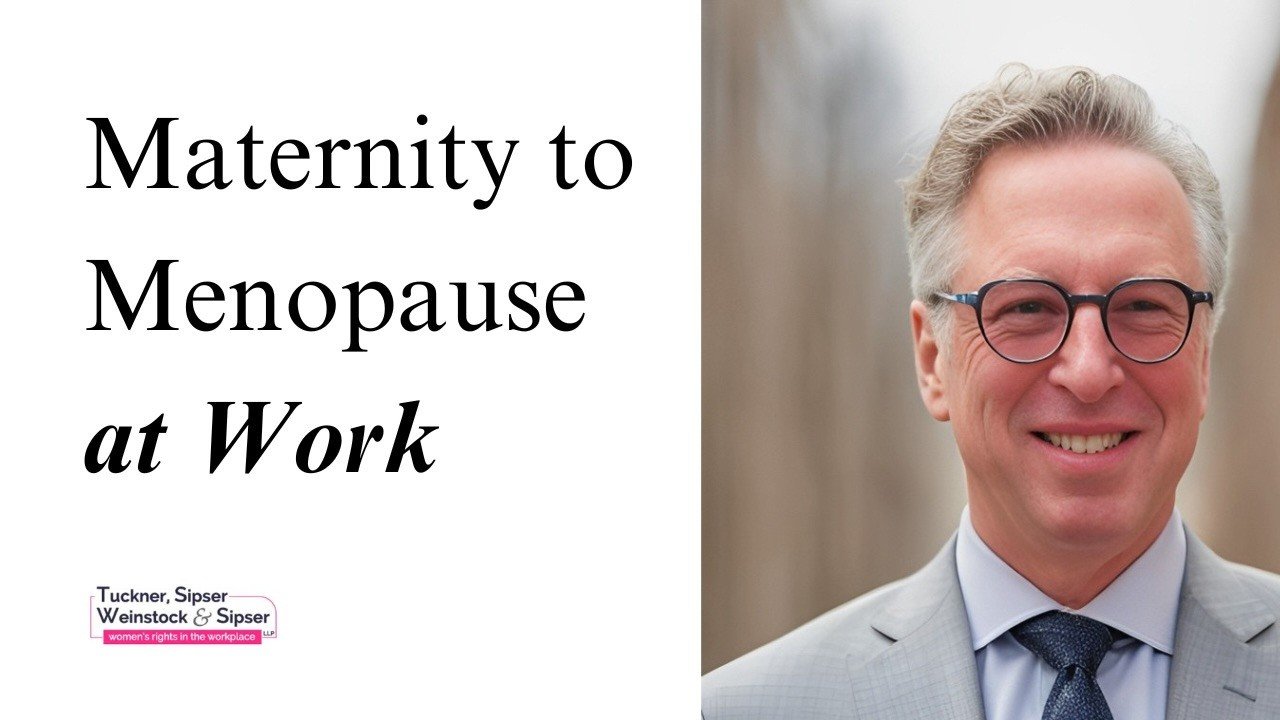Empowering professional women through reproductive stages. Addressing work-life challenges, protections, and guidance.

What is an Arrest and Criminal Conviction History Discrimination?
New York State and New York City's human rights laws prohibit discrimination based on arrest history or criminal conviction history. And there's only two narrow exceptions to this prohibition.

Are You a Victim of Age Discrimination?
If you feel you're being managed out, treated differently, victimized because of your age, you may be a victim of age discrimination and before you're fired, it's best to take action.
Do You Have a Valid Claim for Wrongful Discharge?
Do you have a valid claim for wrongful discharge? Well, ask yourself these three questions for a start.
Am I Entitled to Severance When I'm Terminated From My Job?
There's no law requiring a company to pay you severance anywhere in the United States.
Can I get fired if I report being sexually harassed by a client or customer?
Great Long Overdue News for Fast Food Workers in NYC
Great Long Overdue News for Fast Food Workers in NYC The city of New York recently passed a law requiring “Just Cause” Protections for Fast Food Workers.
Can I Be Fired for Storming the Capitol or Other Free Speech?
Can you be fired for your free speech and or/for storming the capitol? Almost certainly yes, unfortunately. If you work for a private company you can be fired by your employer at anytime for any reason or absolutely no reason at all.
NYers - Make sure you are being paid minimum wage and proper overtime
What Laws Prohibit Sex or Gender-Based Pay Discrimination?
Are you being paid less than your male counterparts? Learn about the laws that protect you against illegal sex-based unequal pay, also known as gender pay disparity.
Should I Sign A Bad Work Evaluation or Write-Up?
New York Employment Lawyer Jack Tuckner explains what you should do if you’re asked to sign a bad work evaluation, and how you can best protect your rights.
Can I Refuse to Travel if I’m Pregnant?
If you’re pregnant, business travel can be difficult, especially if you’re having complications. What are your legal rights and what conversation should you have with your boss?
Can my employer discriminate against me based on my hairstyle?
What Should I Do if I’m Being Sexually Harassed at Work?
Learn what constitutes sexual harassment, what you should do to stop it, how to report it, and how to protect your rights in the event of backlash.
Do you have a sex discrimination case that's valid and worth pursuing?
If you're experiencing any hostility or differential treatment because you're a woman in the workplace, you need to document it and put it in writing to your company. You need to complain, to allow your company the opportunity to investigate your protected Civil Rights complaint, and see it your way and remedy the situation.
Can 1099ers File Discrimination Claims in New York?
As of July 2018, if you work anywhere in New York State, outside of New York City and the remaining 28 counties and you are subjected to sexual harassment, a hostile work environment, or unwelcome sexual attention, you can hold your employer accountable.
Your Rosa Parks Moment
If you're going to have your Rosa Parks moment, make it count. Make sure you document, document, document the complaint, and all follow up to the boss, to the HR department. Whatever happens, put it in writing. Hold their feet to the fire. Stand up for yourself. The Rosa Parks moment, Circa 2018 in the workplace.
Every case has a Statute of Limitations
Every case has a statute of limitations - the date by which it must be filed, or the chances are lost forever. In discrimination cases, sexual harassment, pregnancy discrimination, retaliation, any kind of employment law case, a charge of discrimination must be filed with the United States Equal Employment Opportunity Commission before you're allowed to file in court, and that charge of discrimination must be filed, within either 180 days of the last discriminatory act or 300 days of the last discriminatory act, depending on the state where you work. So for instance, in New York, that federal filing date with EEOC is 300 days from, if you were fired, that is likely the last discriminatory act.
NYTimes says Pregnancy Discrimination is rampant. What Rights Do You Have?
Your company must have a conversation with you about your needs when you're pregnant, and it has to “reasonably accommodate” you - that's the phrase for having a little flexibility when you are pregnant.
Lactation and Work: Your Rights
if your company has at least 50 employees, you are covered for up to a year after your baby is born, you are permitted, and they are required to create, make this space for you to express milk and continue lactating during working hours. Unpaid time, but they can't discriminate and they must permit you to do so. If your employer does not have 50 employees, approximately half of the states in the United States have their own lactation laws such as in New York, and Connecticut, where I practice law - both of those laws go farther than the federal law in protecting women who are lactating.
Disability, Work and the Law
Whatever the challenge you're facing, whether it is something related to pregnancy, or you have influenza, or a more serious issue and you need your employer to work with you, be flexible, compassionate, reasonably accommodate you - make sure that you're documenting all of this, putting it in writing, so you'll have a paper trail, because your employer can’t just be dismissive and cavalier and say, “Sorry, it's too much of a pain in the butt for us, we're not dealing with you anymore.” That would be illegal disability discrimination.

